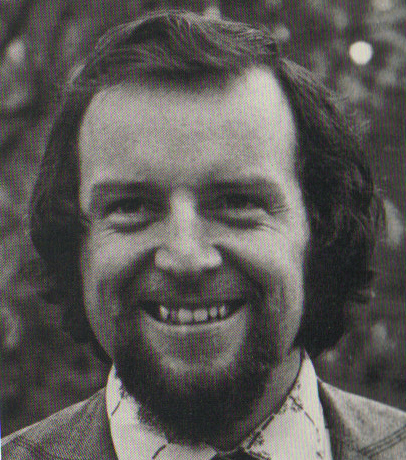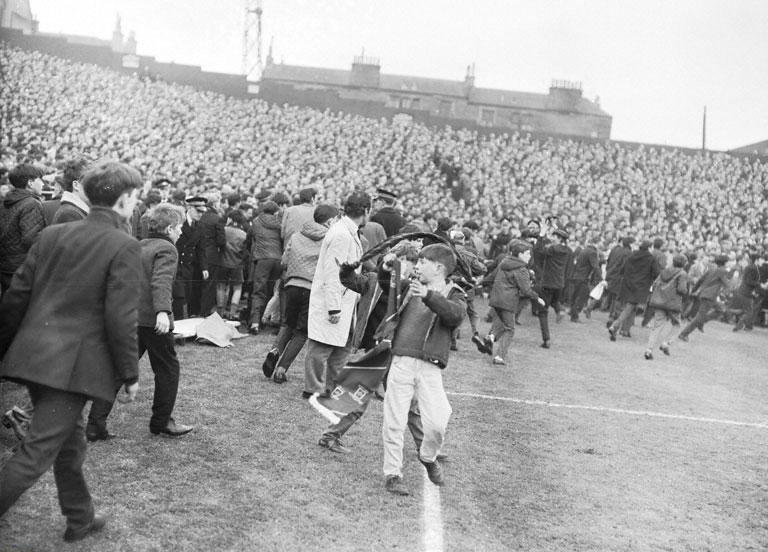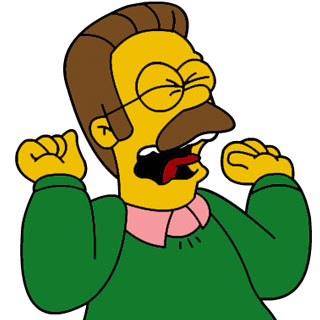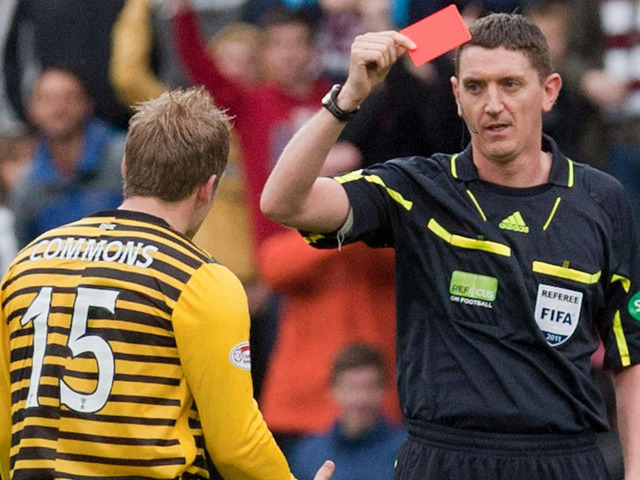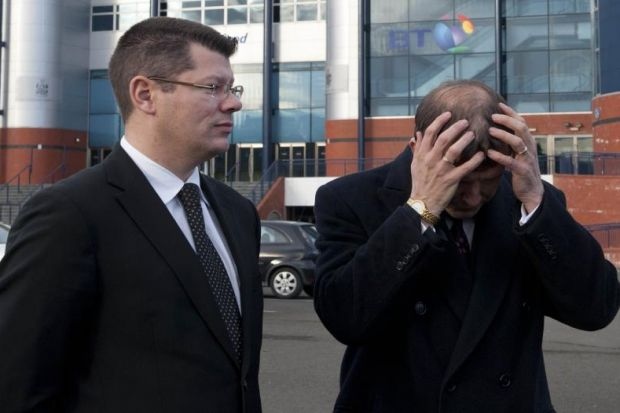In the early 1970’s, Gerald (sic) McNee began to make a name for himself in the world of Scottish football journalism. His big break had came in 1972 when the Daily Express had sent him out to Hungary to cover Celtic’s European Cup quarter final tie with Ujpest Dozsa.
Whilst staying in the Intercontinental hotel in the Hungarian capital, McNee had discovered that the Hollywood megastars Richard Burton and Elizabeth Taylor were staying in the Penthouse suite high above, where a number of Celtic fans and the Scots’ press were located.
McNee managed to make contact with Burton, and on the night after Celtic had won 2-1, Burton and Taylor threw a party for the Celtic fans with McNee able to get an exclusive story and pictures back to the Daily Express in Glasgow. It was the stuff journalists dream of and this ’scoop’ had put Gerry McNee very much into the high profile bracket of football journalism in the country.
On the back of his Budapest big break Gerry had penned a book, aimed at Celtic fans, titled ‘You’ll Never Walk Alone’, which detailed the tales and adventures of both himself and Celtic supporters when travelling to foreign shores during Celtic’s halcyon era in the European Cup from 1966 to 1972. This book sold well and was very popular with supporters at that time and it catalogues a period of time when European travel was becoming more affordable and popular for the ordinary fans.
In 1975 he had assisted the legendary Celt Jimmy McGrory with his autobiography, ’A Lifetime in Paradise’. This was an excellent publication which had shown the public what a genuine person McGrory was and at the same time relay what a wonderful story Jimmy had to tell about his long life as Celtic player and Celtic manager. The book was very well received and Gerry, although critical of the club when it was deserving, was known to be from a ‘Celtic minded’ background and could be relied upon to give an objective opinion. The great McGrory even gave McNee a Scottish cup winners medal from his possession in grateful thanks for his efforts with the book, something that McNee was able to dine out on at length in years to come.
Things began to change in 1978. That year, Desmond White had authorised McNee to write a new official club history to commemorate the club’s 90th anniversary. Some people questioned the worth of this as there was only 10 years left until the club’s centenary. However, in the forthcoming 10 years White himself was to pass on as well as noted Celtic personalities such as Jock Stein, Jimmy McGrory and Tom Devlin, so it would seem that the decision to write the book was vindicated while these men could still be of assistance with the story. There had not been an official history since James Handley’s book in 1960 so there was definitely good reason for the publication.
When the book went on public sale in the autumn of 1978 there was some noted criticism towards it. McNee had been very critical of the team which had lost to Feyenoord in 1970 and this wound was still very raw with the supporters who recalled the defeat only too well and it‘s said that some ex Celtic players were unhappy with his assessment of that game. Also, he had told a story of how John Hughes had gone missing on a Zagreb hillside in 1964 when the authorities had sent out a search party as they were worried about Hughes as there were said to be wild bears in the vicinity. McNee had claimed this was how big John had found the popular nickname ‘Yogi Bear’ but this was denied by various members of the Celtic squad of that period.
By 1980 Gerry McNee, with his Pastor Jack Glass style goatee beard, was a highly distinctive media personality with his work in newspapers and could also be heard regularly on Radio Clyde, then in it’s infancy, with Richard Park and the late, great James Sanderson.
But by far the most controversial incident in his journalistic career came in late August 1980 when the Celtic party and press contingent stayed overnight in a London hotel before travelling to Hungary to defend a 6-0 lead against the quaintly named Diosgyoeri Miskolc.
With the players settled down for the night the Celtic manager Billy McNeill joined some press men in the hotel lounge and began discussing football matters. It’s worthwhile pointing out that no one at this point was ‘tired and emotional’ through alcohol.
McNeill was surprised to hear NcNee launch into a vitriolic attack on the discipline of his Celtic players during a recent defeat to Rangers and told McNee that this was a friendly gathering and there was no need for his tone. However McNee went on and as the pair continued their disagreement McNee suggested to McNeill that they ‘step outside to settle this’.
Now big Billy is a proud man and when someone, in the Glasgow parlance, asks you for outside for a ‘square go’ then he was never going to refuse. The stand off resulted in one blow from McNeill with McNee decked on the floor.
Next morning, in the cold light of day, big Billy had realised he had made a severe error of judgement. He should never have risen to McNee and taken the bait. In view of this he called a meeting of those present and apologised for his behaviour. He also personally apologised to McNee and the pair shook hands. Billy also made a point of keeping Celtic chairman Desmond White abreast of the situation and that looked to have been the end of the matter.
In early October Celtic were controversially knocked out of Europe by the Rumanians of Politechnica Timosoara. Billy McNeill had described the Greek referee that day as the worst he had ever experienced. In Rumania during the post match banquet, Gerry McNee on duty with the Daily Star, could be seen verbally berating the referee for his performance. Strangely, the referee then turned on Frank McGarvey and began castigating him for his behaviour on the field as McGarvey had been (controversially) ordered off. Seeing the situation deteriorating McNeill ordered the players from the dining area back to their rooms and went to update Desmond White on the goings on.
Upon entering White’s room he found McNee giving a detailed account of what had happened. McNeill was incensed and told McNee he had no right going to the chairman behind his back and telling tales and the two men then had another heated argument.
Celtic returned home and only four days later on October 5th 1980 the Sunday newspapers sensationally reported in great detail that the Celtic manager, Billy McNeill, had assaulted the journalist Gerry McNee the previous August. That this was now made public was a huge surprise to everyone at Celtic, it was bad publicity for the club and brought big Billy’s name into considerable disrepute. Celtic fined McNeill £500 which was a hefty sum on 1980 and many felt that the punishment was way over the top given the circumstances.
But the question remained; who had gone to the press about an incident which had happened months previously and that only a handful of people knew of ? Every Celtic supporter believed that they knew exactly who had instigated the story and ran to the media for his own end and for his own mischievous reasons. Devious does not begin to describe this behaviour.
After that Gerry McNee became public enemy number one with the Celtic support. It was felt that rather than reporting the issues of the day he became embittered and chipped away at Celtic with every available opportunity. There was no concern amongst the support at this time as to Billy’s behaviour, indeed the only regret that I can recall Celtic fans having was that ‘the big man didnae hit him hard enough’.
On October 11th after a 2-0 win at Love Street against St Mirren McNeill, clearly incensed, declared that he would not speak to the press corps whilst McNee remained with them. This led to more sensational headlines in the newspapers and a protest from the National Union of Journalists which led to Desmond White reprimanding McNeill and apologising to McNee for big Billy’s actions.
Billy McNeill had never had a great working relationship with Desmond White and the Celtic board but this matter only served to widen the gap between them and, indirectly, the McNee affair led to McNeill leaving Celtic for Manchester City in the summer of 1983. Billy had felt that he had received no backing from his board and the fact they chose to make the £500 fine public had not only riled him but had embarrassed him also. White had constantly shown an intransigent attitude towards his manager during his 5 year reign from 1978 – 1983. The recriminations of the McNee affair would be long and lasting for Celtic.
McNee’s career later took him to STV where he was a monotone commentator for Scotsport in the early 1980’s. An Archie McPherson he was not. He also continued to write columns for Sunday newspapers where he proceeded to irrationally attack a number of targets such as the Celtic board, the SFA and Graeme Souness. At least he was consistent. It was felt that he was controversial for the sake of being controversial and would go out of his way to agitate others for cheap headlines.
Speaking of Souness, he too had a spat with McNee, this time whilst flying back from the Rumanian capital of Bucharest and it was said that ”If he (Souness) had had his way that night, he would have chucked Gerry out a window….38,000 feet high.’ It appears McNeill and Souness actually had something in common and the Rangers manager was physically restrained on the flight.
In later years the younger up and coming journalists were to ridicule McNee’s pompous manner and writing style. He had always been sycophantic towards Alex Ferguson but it surprised no one when the two men were said to have had a fall out and as most people know you cross Fergie at your peril. As Ferguson carried on with his huge success at Old Trafford McNee was seen as an embittered, twisted old hack and Gerry was put out to pasture and could be seen seeking solace in the popular Heraghty‘s bar on Glasgow’s south side.
Billy McNeill will always be remembered as the legendary Celtic captain, standing in Lisbon like Caesar had once stood so imperiously in Rome, taking the acclaim of the masses. Gerry McNee will be remembered for nothing other than the infamy of crossing swords with those two great strong personalities, Billy McNeill and Graeme Souness, and coming off distinctly worse in the process.

